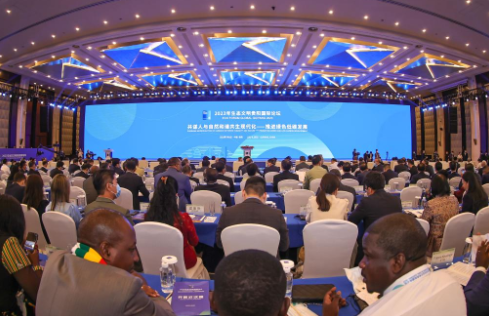
This photo taken on July 8, 2023 shows the opening ceremony of Eco Forum Global Guiyang 2023 in Guiyang, the capital of southwest China's Guizhou Province. China's only national-level global forum focusing on ecological civilization, Eco Forum Global Guiyang 2023, kicked off on Saturday in Guiyang, the capital of southwest China's Guizhou Province.
This year's event, themed "Pursuing modernization of harmony between humanity and nature -- promoting green and low-carbon development," attracts over 2,500 participants with both online and offline activities. (Xinhua/Yang Wenbin)
GUIYANG, July 8 (Xinhua) -- As rare heatwaves grill China, an ongoing global forum themed on ecological civilization in southwest China's Guizhou Province became all the more relevant as parts of its discussions are dedicated to climate change.
Eco Forum Global Guiyang 2023, China's only national-level global forum themed on ecological civilization, kicked off on Saturday in Guiyang, the capital of Guizhou.
This year's event, themed "pursuing modernization of harmony between humanity and nature -- promoting green and low-carbon development," has attracted over 2,500 participants with both online and offline activities.
"I've already felt the consequences of the rising global temperatures," said Danny Alexander, vice president of the Asian Infrastructure Investment Bank (AIIB) when addressing a sub-forum. He noted that this summer, many parts of China are experiencing heatwaves, and terrible flooding took place in Pakistan last year.
Since June, many regions in China, including the Beijing-Tianjin-Hebei region, and Shandong, have logged high temperatures surpassing 40 degrees Celsius, as the meteorological departments continue to issue high-temperature alerts. The much cooler weather in Guiyang, however, offers the forum participants coming from elsewhere in China a respite from the scorching summer heat.
Tamas Hajba, senior advisor for China and head of the OECD Beijing Office, told Xinhua during the event that China's role in tackling climate change is very important, adding that the OECD and China have been cooperating on climate and environment for many years.
China has a lot of experiences and a lot to share with the world. China is a leading country when it comes to the application of renewable energies in the world, Hajba noted. "In terms of the production of solar panels, China is No.1 in the world. In terms of production of new energy vehicles(NEVs) and batteries, China is also a leading country in the world."
"Even more importantly, China has managed to bring down the prices of renewable energies, in other words, to commercialize renewable energies much faster and much earlier than other countries," he added.
China has announced that it will peak carbon dioxide emissions by 2030 and achieve carbon neutrality by 2060. Chinese authorities have introduced a raft of measures to boost the use of renewable energy and reduce carbon emissions, making remarkable progress in that direction.
Data from the National Energy Administration showed that China's installed clean energy capacity saw expansion in the first five months of this year. By the end of May, the installed capacity of wind power had risen 12.7 percent year on year to approximately 380 million kilowatts, while that of solar energy stood at about 450 million kilowatts, a year-on-year increase of 38.4 percent.
China's 20 millionth NEV rolled off the production line earlier this month in Guangzhou, the capital of Guangdong Province, a milestone achievement in the country's NEV sector.
Piao Shilong, an academician of the Chinese Academy of Sciences and president of the Institute of Carbon Neutrality of Peking University, told Xinhua that China is the fastest greening country in the world, and he attributed the rapid greening to the country's afforestation efforts and ecological protection and restoration.
During the 2012-2022 period, China's accumulative afforestation area reached 960 million mu (about 64 million hectares), while 165 million mu of grassland was improved, and more than 12 million mu of wetlands was added or restored, official data showed.
Alexander said China's pledge of carbon peak and neutrality and its driving forward the climate transition will be critical contributions to the world, both in terms of emission reduction and in terms of experience shared with others.
"Climate change is a defining issue of our times, and we are at a critical juncture," said James George, deputy resident representative of the United Nations Development Programme in China, adding that a conference like this which brings new ideas and new thinking is critical.






